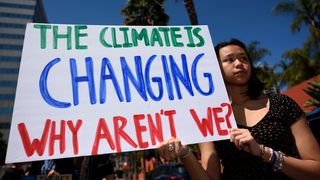On Earth Day on Thursday, US time, Joe Biden will open his two-day virtual climate change summit. Scott Morrison is one of 40 world leaders participating. The goals? To “galvanise efforts by the major economies to tackle the climate crisis” and to “underscore the urgency, and economic benefits, of stronger climate action”.
As with most international gatherings, the statements from political leaders will be penned with their respective domestic audiences in mind. And in both Australia and the US, the politics of climate change policy are fraught.
Sixty-eight per cent of Americans — but virtually all (97 per cent) of Biden’s supporters — say dealing with climate change is a very or fairly important foreign policy goal.
New public opinion research by the US Studies Centre confirms the extraordinary appetite for climate change action among Biden’s supporters in the US. Sixty-eight per cent of Americans — but virtually all (97 per cent) of Biden’s supporters — say dealing with climate change is a very or fairly important foreign policy goal. Moreover, 72 per cent of Biden supporters agree “the US should reward countries who do more to tackle climate change with more favourable trade deals, and impose costs on those who do not” — again a sign of the appetite for Biden’s promise to link climate change policy to foreign policy.
In the transition from Donald Trump to Biden, the position of the US — and its representatives in Canberra — leapt from climate scepticism to ambition and aspirations for global leadership. The early months of the Biden administration prompted speculation about daylight opening between Australia and the US. This speculation received a boost when US special envoy for climate John Kerry, in a February discussion with Al Gore, observed that Australia “has had some differences with us (the US)”, a cause of “one of the problems in Madrid” at the December 2019 UN Climate Change conference.
But this brief aside by Kerry has been the only public sign thus far that Australia and the US are in different places on climate change policy. Otherwise, Australia has sought to accentuate the positive and eliminate the negative, as the song goes, with the Prime Minister’s recent speeches signalling receptivity to a 2050 net-zero emissions target.
Atmospherics and rhetoric aside, Australian and US policy approaches are not far apart. Public investment and incentives for research and development in low-carbon energy technologies figure prominently in Biden’s announcements to date, as they do in Australian policy.
It remains unlikely that friction in the Australia-US relationship will emerge from this week’s summit. Notwithstanding Kerry’s rhetoric, there is too much at stake in the otherwise urgent and burgeoning Australia-US alliance agenda for any differences in climate aspirations to become a sticking point.
“Technology, not taxes” has become a summary of Australian policy; it is also a fair description of where congressional politics will steer the Biden administration. For the time being the Democrats control both chambers of Congress, but only barely. Biden’s climate policy proposals are therefore much more about carrots (government incentives and spending) than sticks (taxes). But wow, what carrots. The scale of Biden’s proposals can’t help but be a stark point of contrast with Australia. Biden’s $US2 trillion ($2.59 trillion) infrastructure proposal includes $US174bn to encourage production, uptake and support of electric vehicles, dwarfing comparable Australian initiatives, even on a per capita or gross domestic product basis. Expect Biden to trumpet these proposals, and the value of “green jobs”, at the summit.
Our survey revealed two interesting facets of public opinion. While 80 per cent of Australians say dealing with climate change is a fairly or very important foreign policy goal, only 50 per cent agree that “Australia should do more” to stop climate change, and only 32 per cent of Coalition voters. As in many countries, climate change is more popular as a foreign policy goal than as a domestic goal — a case of free-riding.
Second, we tested an alternative framing about whether Australia should do more on climate change. While half of Australian respondents were asked if Australia should do more, the other half were asked: “If other countries take stronger actions on climate change, should Australia do more?” We found no statistically significant difference between the frames, suggesting that contrasting Australia’s climate policies with those of other countries does not move public opinion.
It remains unlikely that friction in the Australia-US relationship will emerge from this week’s summit. Notwithstanding Kerry’s rhetoric, there is too much at stake in the otherwise urgent and burgeoning Australia-US alliance agenda for any differences in climate aspirations to become a sticking point. US officials remember the blowback after Barack Obama surprised the Australian government in 2014 with a forward-leaning speech on climate while in Brisbane for the G20. US officials will also note Morrison’s cautious approach to a 2050 net-zero target and offer at most polite encouragement, at least in public. And our polling suggests that overt, international pressure on Australia will not move Australian public opinion.
As Biden is fond of saying, it will be the power of the example set by the US, rather than the example of American power, that galvanises global policy and opinion.




